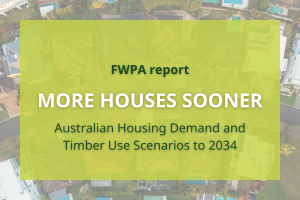The forestry industry could play a vital role in boosting rural development and alleviating poverty in tropical regions, alongside other benefits including positive impacts on conservation and climate change.
According to a new report, millions of people depend on tropical forests for their livelihoods, however low income in surrounding communities is responsible for continued poverty. The UN states 250 million people living in and around tropical forests or savannahs survive on less than $1.25USD per day.
In the report, Dr E.K. Sadanandan Nambiar AO, Honorary Fellow of CSIRO Land and Water, says helping locals out of poverty should be a ‘paramount cause’ of forestry.
“Think about wood as an important driver of both economy and conservation. It’s a mistake to think the sustainable management of forests, including wood harvesting, is somehow an opposing value to conservation. It’s not – conservation and sustainable management must and can co-exist,” Dr Nambiar said.
Dr Nambiar believes timber became unfashionable for a period due to a global shift in dialogue towards the importance of the role forests play in storing carbon. As a result, for the last two decades the opportunity to use forestry for poverty alleviation has been lost.
Boosting wood production is not incompatible with carbon and conservation objectives, according to Dr Nambier.
“In many circumstances timber production can help to mitigate climate change, due to forest sequestration of carbon. Long-lasting wood products such as buildings and furniture store carbon for decades, while other wood products are largely carbon positive. Timber-based options offer an alternative for high-emission materials in construction.”
While in recent times demand for wood products has been rising in developing countries, they continue to face wood deficits. India and Ethiopia, for example, produce much less wood than is consumed, yet spend millions of dollars on wood imports. At the same time, income gaps between rural and urban populations are widening.
This situation provides opportunities to develop commercial forestry in those areas, and use this as a tool for rural development and poverty alleviation.
The report notes that poverty can be alleviated only where local actions spur economic development. For this to happen, communities must be rewarded by receiving a fair share of the income generated.
Dr Nambiar explains the key is helping tropical countries improve the growing, processing and marketing of their wood products. In some places, that could mean working with large-scale plantation forestry, while in others the focus would be on small growers.
Strengthening the businesses of small growers in particular could act as a catalyst for local entrepreneurship. Strategies are therefore needed to improve the productivity of small scale enterprises, yet a lack of current research exists to facilitate this.
Other barriers identified in Dr Nambiar’s report include the lack of transparent and legal land ownership rights, bureaucratic regulations, and cumbersome, unaffordable international forest certification systems. Dr Nambiar believes actions are possible to reduce or remove all of these road blocks.
“We need to reimagine and interconnect commercial forestry, greater use of wood, judicious substitution of high-emission materials with carbon positive wood products, and thus create opportunities to strengthen forestry-based businesses for rural development,” he said.
“A renewed narration and efforts on these fronts will offer sustainable pathways to help alleviate rural poverty in tropical regions. We need to fulfil forestry’s promise – the science and art of managing forests sustainably for the people. That requires an economic foundation for forestry, in balance with the environment and conservation.”
In 2014, Dr Nambiar was made an Officer of the Order of Australia (AO) for his contribution to forest science and sustainable management.
Sources: Forests News & Science Direct



